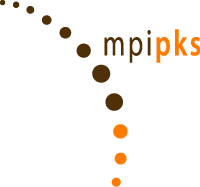

Tensor Product State Simulations of Strongly Correlated Systems
Workshop Report
Tensor Product State Simulations of Strongly Correlated Systems
Scientific Report
The MPI-PKS International School “Tensor Product State Simulations of Strongly
Correlated Systems” (TENSOR16) was held from November 1-5, 2016. The goal of
the school was to teach young PhD students the basics of tensor-product states as
well as the most recent technical developments. This is particularly important given
the increasing number of groups working on this quickly evolving topic. The lectures
were given by researchers who work actively both on the development and the
application on tensor-product state based methods.
The TENSOR16 school provided pedagogical introductions to matrix-product state
based methods and discussed the most recent numerical and analytical
developments in the field. The school comprised of five lectures and tutorials on
different topics:
• Entanglement, matrix-product states, simple algorithms, some Python basics
(Lecturer: Frank Pollmann, Dresden)
• Time dependent variational principle
(Lecturer: Laurens Vanderstraeten, Ghent)
• Applications of MPS in condmat and AMO
(Lecturer: Fabian Heidrich-Meisner, Munich)
• Introduction to Projected Entangled Pair States and the multi-scale entanglement
renormalization ansatz
(Lecturer: Phillipe Corboz, Amsterdam)
• Topological orders in tensor networks: Analytical approaches
(Lecturer: Norbert Schuch, Munich)
The school was very well received by the students and the feedback given was
extremely positive. The tutorials and hands-on sessions were particular popular as
these allowed a direct application of the theory taught during the lectures. All lectures
notes and tutorials are public and can be accessed from the website of the European
Tensor Network (quantumtensor.pks.mpg.de).
The students participated very actively throughout the entire program and the
questions asked led to stimulating discussions. We were also happy to see that the
school helped students from different groups to get to know each other which will
foster future scientific exchange (the students in fact formed an independent
Facebook group to stay in touch).
All students had the opportunity to present their own work during a poster session.
The poster session was very well attended and the students discussed their work
among each other and with the lectures until late night.
Scientific Coordination: Frank Pollmann (MPI-PKS, Dresden), Norbert Schuch
(MPQ, Munich), and Frank Verstraete (Ghent).
Organization: Mandy Lochar from the MPI-PKS, Dresden.
